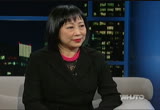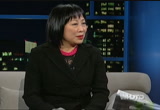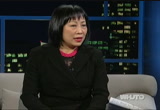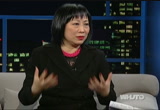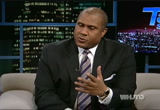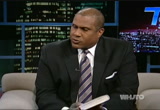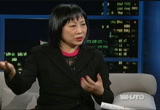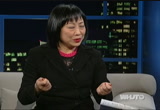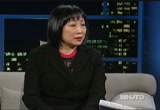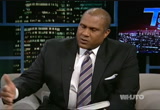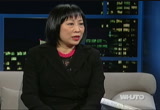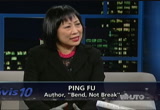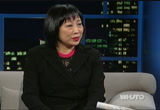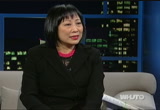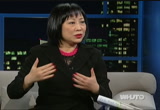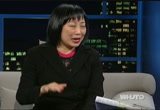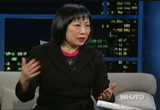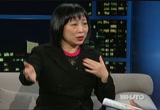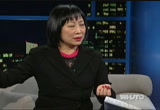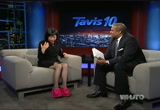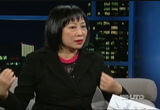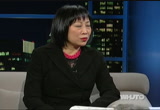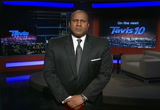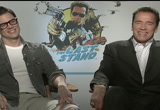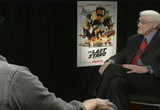tv Tavis Smiley WHUT January 31, 2013 7:00pm-7:30pm EST
7:00 pm
tavis: good evening. from los angeles, i am tavis smiley. tonight, a conversation with the ceo of geomagic, ping fu. a remarkable journey from labor camps in china to one of the most prominent c.e.o.'s, and she has a new book, "bend, not break," and she was named entrepreneur of the year back in 2005 and now serves on the obama council of entrepreneurship. we are glad you joined us. a conversation with geomagic's ceo, ping fu, coming up. >> there is a saying that dr. king had that said there is always the right time to do the right thing. i just try to live my life every day by doing the right thing. we know that we are only halfway to completely eliminate
7:01 pm
hunger, and we have a lot of work to do. walmart committed $2 billion to fighting hunger in the u.s. as we work together, we can stamp hunger out. >> and by contributions to your pbs station from viewers like you. thank you. tavis: started a successful company is never easy, but it may have seemed impossible for ping fu, growing up under mao, and she was sent to a labor camp, where she adored unspeakable hardships.
7:02 pm
she knew just three english words into her vocabulary and came with little money in her pocket. my favorite, "hellboy." she found her way into software, starting her own software company called geomagic, which she continues to lead as its ceo, and her new book about her remarkable journey is called "bend, not break: a life in two worlds." it is a pleasure to have you here. >> thank you. tavis: it was 8 when they came to get you. tell us what life was like before mao's call to revolution and you heard that knock on the door. >> i was living with my parents. they were the most loving parents i could have. i was the youngest one of six. i have five siblings. they would play with me all of the time.
7:03 pm
i would be in the kitchen. my mom likes to cook wonderful meals, and she always says she puts a lot of love in her food. tavis: all right, so you are 8 years old, and the revolution of mao is in full swing. you get that dreaded knock on the door. take it from there. >> xiang hi father was locked up. i knew something was happening. one day, i heard this loud noise, and they marched into our backyard, and then i heard my mom crying, saying, "she is so little." i was in the library, and i looked out and saw them marching in, and they said, "she is there." and i knew they came up for me. that is the first time that they told me that they were not my birth parents, and they said,
7:04 pm
yes, that is true. do not fight. and i was screaming and kicking, and i said, "last week, you told me i was your favorite." i was taken away. tavis: that seems like a double trauma, the first trauma being you were taken away, the second trauma finding out that you're sharing my mom and shanghai dad where not your parents. how does an eight-year-old process all of that at the same time? >> it happened so quickly, and i was put on this jam packed train with strangers, and at that point, i knew that i wanted to be with somebody. i did not like to be alone. but when i arrived, i arrived a little too late. my parents were put on a truck
7:05 pm
to be taken away, also. so one day, i lost the parents raised me and the parents born. tavis: so you think you are going to be with your parents, and when you get there, they have been placed on another train. what happens? >> there was a lot of chaos. a few hours later, i was taken to a dormitory, which was an old student dormitory, emptied out. it looked like a garbage can, literally. there, i found my little sister, who was only four years old. tavis: let me back up a bit. this is pbs, and this is a very learned audience, but not everyone knows what the mauer revolution was. -- the mao revolution was about. the cultural revolution.
7:06 pm
>> yes. mao lost the power it a few years before the cultural revolution to to the famine he created, and cultural revolution was his way to regain the power, of using stalin's method, and he turned the country upside down and told us that we did not need to go through formal education. we all needed to learn from farmers and workers, and that was how we would get reeducated. it was the biggest persecution of educated families. tavis: so at eight years old, you ended up in a dormitory, and you are looking out for your little sister, at the age of age. take me back to the dormitory and tell us how like sort of begins anew for you in this camp, as it were. >> yes.
7:07 pm
in the beginning, it was really confusing and scary, because we did not have food. the room had no wash basin, no kitchen facility, and we were taken to the soccer field to witnessed the killing of teachers, and we were brainwashed that we were nobody, and we were born with black blood, as part parents were called that. >> what becomes your daily routine when you are 8 years old? 8, 9, 10? >> the first few months was chaos. we were nobody. then i think about one year later, i was assigned to work in the factory. some of the older kids got sent, but i was too young. i went to a factory, and then later i learned how to be an
7:08 pm
electrician. manual work. tavis: so when you are a 10, to your point, you are working in the factory, but as i read in your book, that is a lot better for you. the experience of doing that is better for you because at least you are doing something for the benefit of somebody else. tell us how you process of being in that factory as a nine-year- old, 10-year-old, working on radios, etc.. >> being told i was nobody, and then going to the factory. the workers were quite kind to me, and radio was something that we all had at home. they were broadcasting their messages. so being able to turn on the first radio that we build and to know that i actually made that, and that is the one being used by everybody, i felt a sense of
7:09 pm
accomplishment. tavis: at such a young age, who was nurturing you? i in trying to imagine 8, 9, 10, and you are building radios, and you were taking care of your little sister. both sets of your parents are gone. eight-year-old, nine-year-old, you are still a baby. who is doing that for you during this period? >> there was not any nurturing. there were other people around. there were other kids who do not have parents. communist families, and i see them have parents. but the only thing i had was the memory of my childhood house. the first eight years where i did have a very loving family.
7:10 pm
otherwise, there was nobody there to give you a hug or make food for you. >> what did you eat? how did you eat? what was your source of nutrition? >> we would eat that stuff. otherwise, i would did a lot of vegetables from the ground, while the vegetables. we had so many kids. kids that were bigger than me. we all tell each other. even today, i look for those wild vegetables. they are really, really good, actually. i raised chicken. i had aids. -- eggs. tavis: how long with this experience are you forced to endure this maoist experience? >> the cultural revolution lasted for 10 years plus two. i was alone the first five
7:11 pm
years, and then i came back when i was 13. a few years later, it did get better. it loosened up. 1972, when nixon visited china, diplomacy, it got further better. the first few years were probably the worst. tavis: i want to fast forward because you end up doing some more to expose another atrocity in the people's republic of china, as relates specifically to the one child policy. so take me from the camp where you were held during the cultural revolution. advance me a few years to your working on the writings about the one-child policy. >> so the cultural revolution ended in 1976, and then the
7:12 pm
university in 1977. i went to college in 1978, when my father came back. i did not have any choice of what to study. i wanted to be an astronaut, but i ended up to study chinese literature, because that was an assigned maj. before graduation, i decided to do humanitarian work for my thesis research. i heard that girls were being killed or were having abortions in very late terms due to the one-child policy. the one-child policy is that every couple can have just one child. farmers wanted boys. so i wanted to do that research, and i turned my research to my teacher, and she gave it to a friend, a newspaper, where her friend was the editor, so they
7:13 pm
wrote an editorial, basically calling to stop the gender inequality or killing. it was good editorial coverage. little did i know that was the very first time a chinese newspaper had admitted that was happening. that is what got me in trouble, and i got thrown in jail for that. tavis: so it is bad enough under the cultural revolution that you are incarcerated, as it were, told what to do, where to go, and you have already dealt with this once in life. now the revolution is over. you get a chance to go to college, and you write about this, and you end up back in jail again for doing that. how did you process that? >> it was really sad. i saw my life turned around. i thought i was going to get killed. but i did not know what would happen with my life.
7:14 pm
i had just started to love what i'm doing at the college, but then my sister got older. by then. i thought that was ok. i do not have responsibility anymore, like when she was little. it was very sad. tavis: ok, so you get thrown in jail for writing about the inhumanity of this one-child policy and what is happening to girls all throughout china, and ultimately, at some point, either they tell you or you discover that you are not going to be put to death, but you are getting kicked out of here. so they are not going to kill you, but you will have to get out of china. >> i was asked to leave quietly. i did not know, but now i know because there was a journalist to wrote about the same thing and published a book in 1983, and his book and my research the same year was a coincidence, but
7:15 pm
it formed a perfect storm for the international outcry for human rights violations. china's new government was embarrassed, and accidentally, they actually validated the claim. killing me would only cause more trouble, so i was asked to leave and never come back again. not apply for political asylum, and just go and be a student and live my life somewhere else. tavis: and that somewhere else was where? >> that somewhere else luckily happened to be the united states. tavis: where? >> i got a visa from the university of new mexico. i flew with a dollars in traveler's checks in my pocket. when i landed, i was $5 short for my ticket. an american man behind me gave the $5. that was my first impression of
7:16 pm
america. that people are generous and helpful here. tavis: the extra $5 got you to new mexico. >> right. tavis: but when you get here, your english is not so good. >> yes, i tried to learn more, but i could not remember anything. tavis: so you soldiered to new mexico. it is one thing when you do not have any money, but you cannot speak the language. when you get to new mexico, how do you navigate your way through? how do you make this work? >> all right, first, i studied english as a second language. the connections to the homeland, i knew i could not go back. i knew i had to stay here. i stayed with my english teacher so that i could learn more
7:17 pm
english quickly, and then i observed that my english teacher could not find a job with a ph.d. in literature. tavis: that is not funny, but it is. >> so i thought i was going to study comparative literature, and i did not have enough english, either, so i thought i had to study something with marketable skills, so i asked someone what i could steady since i did not have a formal education. i did not have math or science. and someone said to check out this new field of computer science. and he said it was a man-made language. and i thought, great. i am good with language, and i know how to make stuff. fortunately, that was a great and rising newfield. tavis: what do you make a looking back on it now?
7:18 pm
what do you make of how it came to be, the burgeoning growth of computer technology just happened to coincide with your arriving here? somebody suggested, maybe you ought to try this? i am asking how you process that. i get to that because of the success you have had, sitting on the obama commission. it is quite a fascinating journey. how do you look back at that decision at the time when you can barely speak english to study computer science? >> what is taught me is behind every closed door there is new opportunity. it is like every time life shut the door, it closes on me, high end up doing something else, and it is a new world that opens up for me. i learned in my life's journey many times that when something -- when it looks like there is no work -- no road ahead of you, behind that mountain, there is
7:19 pm
another road. there is always, if you try, you can always find a path. tavis: give me some key markers down the road, a key moments that happened for you that allowed you to get to this place with geomagic, once you left new mexico. >> first, i met an entrepreneur in city ago. i worked for him while i was studying computer science. then, i took a job at bell labs because it was an iconic company. i took a pay cut from the starting job to the bell labs job to pursue innovation and education. and then i got bored at bell labs and took another job at the university and again took a pay cut because i saw that i was going to make a movie with
7:20 pm
arnold, and that was something i wanted to do. it was art and science and visual. i would do that without being paid. interestingly, at the start a company, i did database, and at the other, i did network. i did graphics at another company. those three are what form the basic for the mosaic browser, which turned into netscape and internet explorer. so being able to guide this group of students to create this first multimedia internet browser comes from my trajectory of pursuing something that i and interested in, not necessarily about a higher position or better pay. it gives me that basis to do that. tavis: given where you started, what do you make about being on the front side of the internet browsers, netscape?
7:21 pm
marc andreessen is iconic. he is yours did. what do you make of how all of this came to be, given where you started? >> i think of part of it when i look at it is that i was a nobody, and i wanted to be somebody, and i did not know where to start, so i went this like journey of never agreeing to that i was nobody or that i could not do something, but i also did not have a target, so i traversed my life in this unconventional way, just pursuing whenever i had a passion for, whenever i felt could contribute to society or the technology that would be tomorrow. i pursued that. and that is what i climbed this mountain range. at every peak, the view is different, but for you to arrive at a different peak, sometimes you have to go down before you go up. sometimes we do not want to take
7:22 pm
a downside, we just want to keep going up. there is nothing wrong with that. tavis: it is anti-american to step down. that is our problem. but you are right. you cannot go to that next peak with of the ebb and flow. >> it is very interesting, because when i started geomagic, i wanted to combine internet technology. i was working with the internet. the idea was to change the manufacturing to mass personalization. you can see my shoes. this is 3-d printing. this is the technology of tomorrow. tavis could get that shoe -- tavis: get that shoe. >> bid is at a museum of art.
7:23 pm
lightweight. biodegradable. but my passion is about how can we change the things that we design and manufacture such that we can bring jobs back to our country and to have greener technology. less of a carbon footprint. i think this is the next big thing. tavis: i think i get it, and i think the audience gets it now, but when you named this book, what were you thinking? >> whether or not on to a partnership or a country being divided or a business going through a difficult environment, we need this assistance and how we live. tavis: i have been to china and have had the honor many times. my very first trip, i was taken
7:24 pm
by a friend of mine, and after spending a week or two in china, i learned so much. it the last day of the trip, we rescinding and waiting on a plane to take off. traveling between beijing and shanghai, and i did not realize that she had grown up in that cultural revolution. and after being there for all of these days and learning so much, the most moving part of the whole trip was sitting there and talking to her about what it was like trying to navigate and move through that period of history that you had to endure, and i am so glad that you got through it and that you are doing a wonderful work that you are doing now. tell me quickly about the work you are doing with president obama in this on to a partnership -- and this entrepreneurship. >> these are two topics very dear to my heart.
7:25 pm
we meet quarterly to give advice and to remove barriers so that more is available to entrepreneurs and innovation. innovation is the key for us to create jobs in this country. tavis: you start out being told that you are nobody, and you end up working with the president of the united states. >> life has treated me well. tavis: the book is called "bend, not break." good to have you on the program. thanks for tuning in. as always, keep the faith. >> for more information on today's show, visit tavis smiley at pbs.org. tavis: hi, i'm tavis smiley. conversation with a grammy-winning singer and songwriter, aaron neville.
7:26 pm
that is next time. we will see you then. >> there is a saying that dr. king had that said there is always the right time to do the right thing. i just try to live my life every day by doing the right thing. we know that we are only halfway to completely eliminate hunger, and we have a lot of work to do. walmart committed $2 billion to fighting hunger in the u.s. as we work together, we can stamp hunger out. >> and by contributions to your pbs station from viewers like you. thank you. >> be more. pbs. tavis: hi, i'm tavis smiley. join me next time for a conversation with
94 Views
IN COLLECTIONS
WHUT (Howard University Television) Television Archive
Television Archive  Television Archive News Search Service
Television Archive News Search Service 
Uploaded by TV Archive on

 Live Music Archive
Live Music Archive Librivox Free Audio
Librivox Free Audio Metropolitan Museum
Metropolitan Museum Cleveland Museum of Art
Cleveland Museum of Art Internet Arcade
Internet Arcade Console Living Room
Console Living Room Books to Borrow
Books to Borrow Open Library
Open Library TV News
TV News Understanding 9/11
Understanding 9/11

